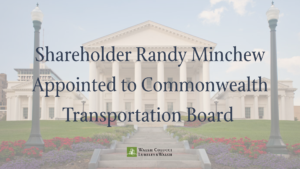Federal Trade Commission’s Final Rule Banning Non-Competes is Published on May 7, 2024
After months of input on a proposed rule, the Federal Trade Commission’s (FTC) final rule banned non-competes for almost all workers beginning 120 days after the rule’s publication in the Federal Register. If the rule is not successfully blocked through court action, the rule will be effective on September 4, 2024. The rule as published is a ban on “new non-competes with all workers” and it invalidates most non-competes in place except for those who are “senior executives”- which is defined as those workers who earn over $151,164 annually who are in “a policy-making position”. Multiple legal challenges have already been filed by the U.S. Chamber of Commerce and other groups in Texas and in Pennsylvania, however, if the rule is not successfully blocked from going into effect, then companies or individuals who entered into non-competes with workers other than senior executives, must give notice to the worker by the effective date of the rule on September 4, 2024 that the non-compete will no longer be enforced.
The rule has limited exceptions and does not apply among other listed reasons:
1. When the non-compete involves a person pursuant to a sale of a business entity and that person’s ownership interests in the business entity,
2. When a cause of action related to a non-compete has accrued prior to the effective date of the rule.
There are other situations which might apply differently to each worker’s status and these should be evaluated on a case-by-case basis withf an attorney. The rule also does not eliminate non-solicit, confidentiality and/or non-disclosure agreements between companies and their workers.
The FTC ban on non-competes, assuming it goes into effect, would override current Virginia law regarding non-competes (Virginia has its own ban on non-competes for low wage earners, which is based on a moving salary threshold determined annually, and which as of January, 2024, was an annual salary of $73,320 (Virginia Code § 40.1-28.7:8)).
For questions about the FTC’s or Virginia’s non-compete requirements please reach out to the attorneys at Walsh, Colucci, Lubeley and Walsh, P.C..
What Employers Don’t Know About the National Labor Relations Act (NLRA) Can Hurt Them
It is likely that many employers assume that if they don’t have unionized workers that they do not have to pay much attention to talk about the National Labor Relations Act (“NLRA”). However, even for employment sectors with no unionized employees- the NLRA policies apply as they affect most non-supervisory employees.[1] The more recent rulings by the National Labor Relations Board (“NLRB”), which oversees and administers the NLRA, indicate that the Board is more employee friendly than ever before- so employers ignore the potential impact of the NLRA on their business at their peril.
Back in February of 2023, the NLRB issued a ruling in McLaren Macomb, 372 NLRB No. 58 (2023), that determined an employer’s severance agreements, which were offered to furloughed employees, were unlawful because they interfered with, restrained, and coerced employees in the exercise of their Section 7 rights.[2]
These severance agreements (like most I have come across in my legal career) contained a provision prohibiting the exiting employees from making disparaging statements about the employer (a non-disparagement provision) and from disclosing the terms of their severance agreements (a confidentiality provision).
The NLRB determined “a severance agreement is unlawful if its terms have a reasonable tendency to interfere with, restrain, or coerce employees in the exercise of their Section 7 rights, and that employers’ proffer of such agreements is unlawful.”
In August of 2023, the NLRB ruled in Stericycle, Inc., 372 NLRB No. 113 (2023), that an employer violated Section 8 of the NLRA by maintaining certain rules for its employees that addressed personal conduct, conflicts of interest and confidentiality of harassment complaints.[3] The NLRB announced a new standard by which to judge whether employers’ work rules and policies violated the NLRA. Instead of judging the policy from the perspective of the employer (and whether they had a business purpose behind implementing the rule) the NLRB signaled the new standard would be from the perspective of an employee who is economically dependent on the employer (and which employees aren’t?) and whether the employee could reasonably interpret the work rule to have a coercive meaning presuming they were contemplating engaging in protected concerted activity under the NLRA—then the burden would be met from the perspective of the NLRB general counsel (who is responsible for the investigation and prosecution of unfair labor practices under the NLRA) in their efforts to declare the rule unlawful.
Protected concerted activity could mean anything from talking to co-workers about wages and benefits, to participating in a concerted refusal to work in unsafe conditions, or joining with co-workers to talk directly to the employer, the media or an agency about problems in the workplace. The employer could then counter that presumption of unlawfulness, by proving that the work rule advances a legitimate and substantial business interest, which cannot be advanced with a more narrowly tailored rule or policy. If the employer successfully meets its burden, then the rule stands. However, with little to no guidance to support what each of these burdens actually entails, there is no way to know how easy it might be for an employer to successfully rebut an initial presumption of unlawfulness.
In Stericycle, the NLRB also struck down the long-standing policy of deeming certain work rules to always be lawful, including rules maintaining investigative-confidentiality rules, non-disparagement rules and rules prohibiting outside employment. So at this point, policies related to workplace conduct and expectations are all subject to higher-levels of scrutiny.
To the extent policies or agreements in the employment setting are found to be unlawful by the NLRB, employees might be reinstated, obtain backpay awards if terminated due to violating such a rule/policy or other penalties. The NLRB may order an employer who engages in an unlawful business practice to cease such practice, and formally issue a revised and compliant policy. It is clear the NLRB is investigating unfair labor practice charges with a greater eye toward protecting employee’s rights than ever before.[4] Even if no unlawful policy or rule is found, these types of investigations disrupt the workplace and cause businesses to spend time and money defending their actions.
In the wake of these decisions, employers offering severance agreements to its employees would be wise to utilize counsel to ensure that the agreement can be drafted in such a way that it does not run afoul of the NLRB’s requirements with respect to confidentiality and non-disparagement clauses. It is also not a stretch to assume that the reasoning in McLaren Macomb might be extended to other types of agreements, including settlement agreements, employment agreements, and restrictive covenant agreements used in the employment setting.
Additionally, employers should have any employment handbooks reviewed by counsel to have them updated to ensure that current work rules and policies are compliant with the new rulings of the NLRB.
The employment attorneys at Walsh, Colucci, Lubeley and Walsh, P.C. can assist with review of severance agreements, non-competes, employment contracts and employment handbooks.
______________________________________________________________________________________________________________________________________________________________________________________________






